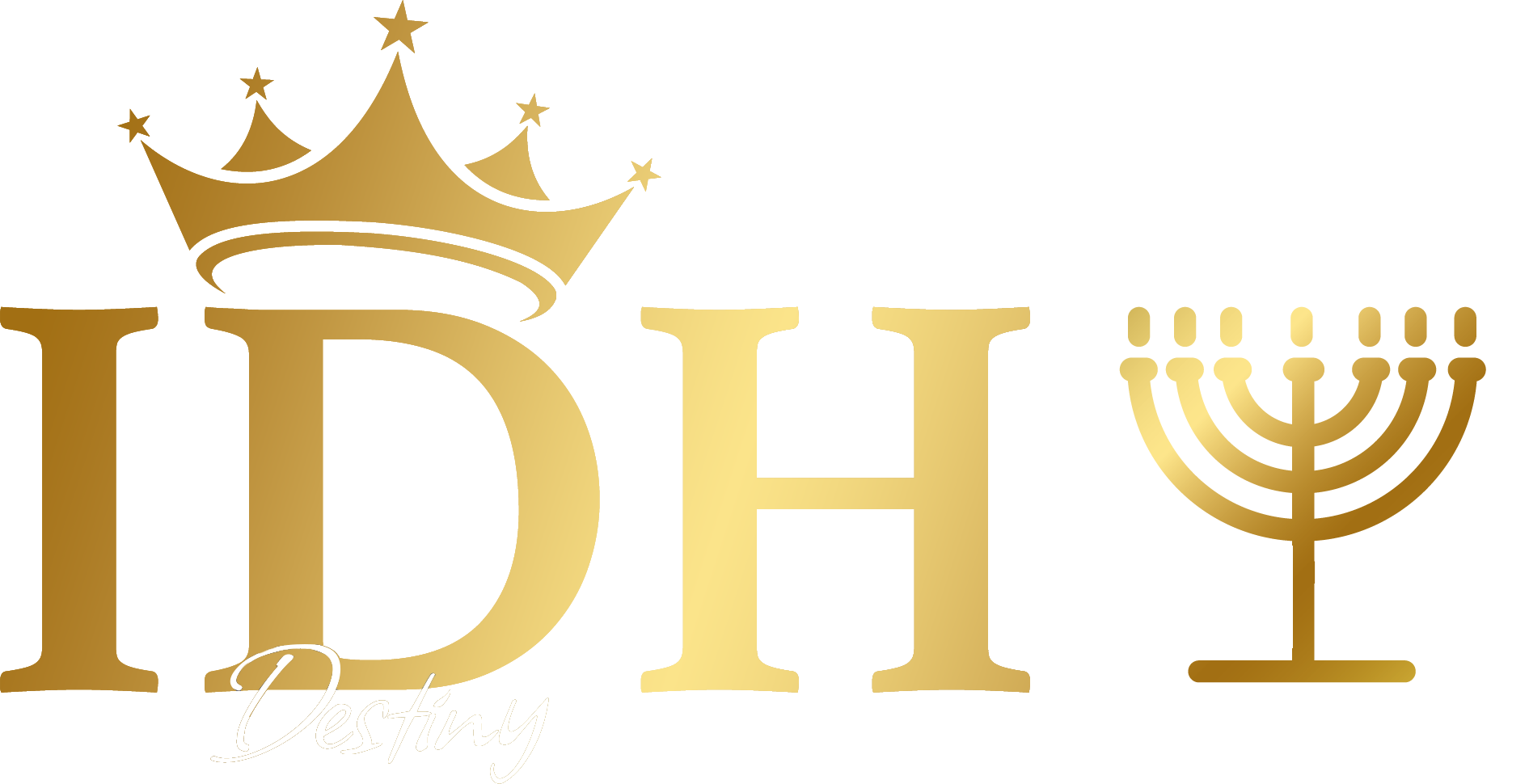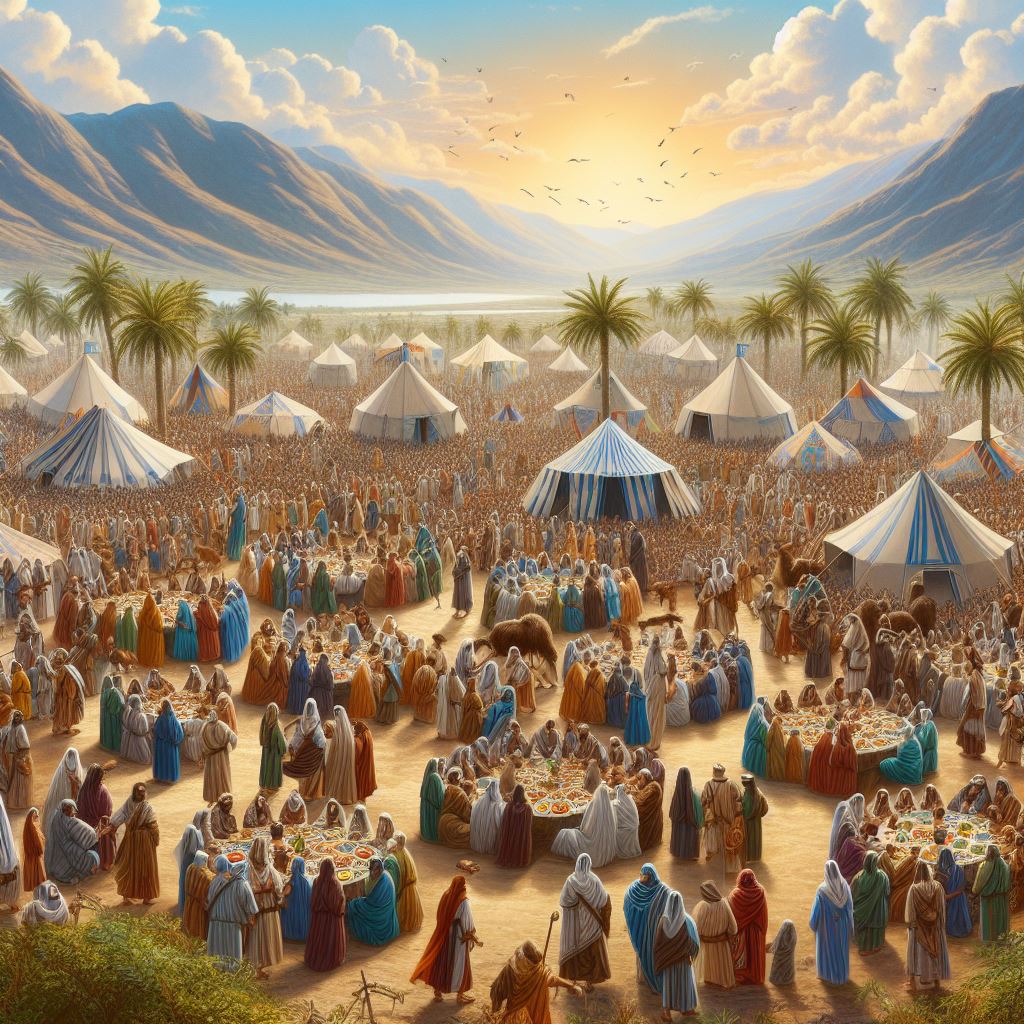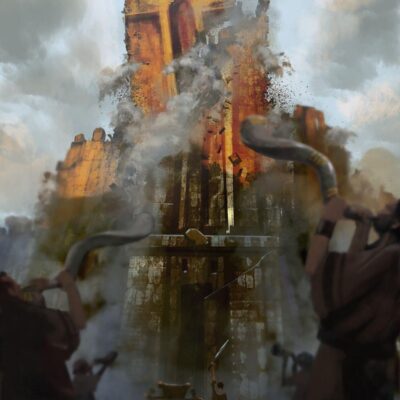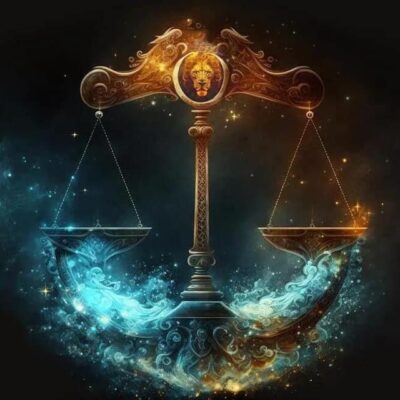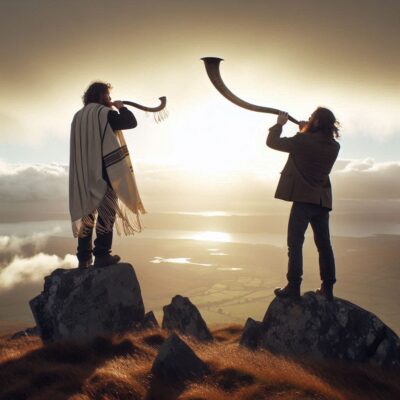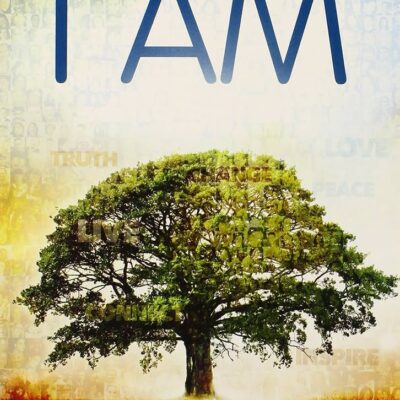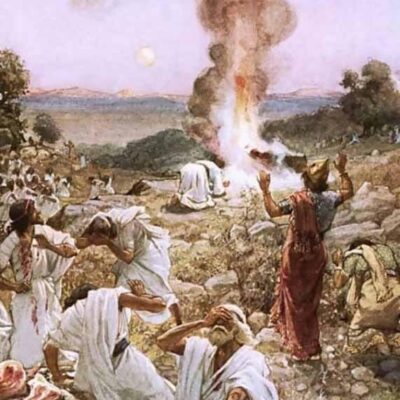We all know that our English word Holiday was originally a ‘holy day’; but what, or rather who, made one day more special or set apart than another?
–
Holidays were in fact God’s idea. He created all that we know in 6 days, and then He ceased from work Genesis 2:1-2
“And so the heavens and the earth were completed, and all their heavenly lights. By the seventh day God completed His work which He had done, and He rested on the seventh day from all His work which He had done. Then God blessed the seventh day and sanctified it, because on it He rested from all His work which God had created and made.”
–
God did not need to rest, but He chose to do so; and He included this advice to Moses at Mount Sinai when He said “Remember day 7 and set it apart as holy”, and then in Leviticus 23, Moses recorded that Day 7 – the Shabbat, from Sheba, the Hebrew word meaning ‘seven’ – would be a special holy feast day. God told Moses to earmark the day on his calendar as special, along with certain days that were significant on God’s calendar.
–
We all have dates that are special to us in our calendars – birthdays and anniversaries which we pencil into our diaries and try to avoid unnecessary work so that we can celebrate and spend time with those we love. God’s calendar is no different – though Moses would have had no idea at that time of the significance of those particular days and festivals in world history when he repeated the instructions to God’s people.
–
Leviticus 23 contains all of the relevant details of the Feasts of the LORD, and it is important to note that these were, and are, the Feasts of the LORD – not simply the Feasts of the Jews, or the Feasts of Moses – they were decreed to be Feasts of the LORD for all time!
Leviticus 23:4 “These appointed times/feasts/Moedim of Yahweh (are) holy/sacred assemblies that you shall proclaim at the appointed times/Moedim”
Leviticus 23:14 “… it shall be an enactment/a statute forever”.
This same phrase ‘huqqat owlam’ – ‘a statute forever’ is repeated in verses 14, 21 and 31 of Leviticus 23.
–
Why do we put dates in our calendars? Either to remember and commemorate something special such as a birthday or anniversary – or because we have an appointment and plans that we do not want to miss. The Feasts of the LORD are no different. It may seem strange at first, but these special holy days – and several of them were week long events, would mark out God’s redemptive plan throughout the generations and the plan is still to fully unfold on the world stage. For more than 1700 years, since the rule of Emperor Constantine in Rome, the Church has tried to dissociate itself from its Jewish roots, and over time, the Jews have created many additional fast and feast days, but the truth remains that the 7 feasts listed in Leviticus 23, along with the weekly 7th day – are special times, set apart on God’s calendar, for believers to take time away from work, to eat together, and observe God’s redemptive plan as it unfolds.
–
Generally speaking, the Feasts can be understood as the spring feasts of: Passover, Unleavened Bread and First Fruits which all take place within a week of each other. Fifty days after the First Fruit offering was made there would be another feast – known as the Feast of Weeks or Shavuot which did not have a specific name in Leviticus 23, but it would become the date when God revealed His glory and truth to the people at Mount Sinai as He instructed them in how they should live. The Greek word for ‘fifty’ is ‘Pente’ and Shavuot became known as Pentecost in the Greek speaking world. We often speak of Pentecost as though it began when the tongues of fire descended upon the believers, however Pentecost was the name that Greek speaking Jews would use to describe a Feast that had been celebrated since the time of Moses, and that was the very reason the believers ‘happened’ to be in Jerusalem to experience this incredible phenomena. Acts 2:1-3
“When the day of Pentecost had come, they were all together in one place. And suddenly a noise like a violent rushing wind came from heaven, and it filled the whole house where they were sitting. And tongues that looked like fire appeared to them, distributing themselves, and a tongue rested on each one of them. And they were all filled with the Holy Spirit and began to speak with different tongues, as the Spirit was giving them the ability to speak out.”
–
–
Pentecost does not mean ‘the day the disciples were filled with the Holy Spirit’ – Pentecost means ‘fifty’ – as in the 7 weeks plus 1 day after the Feast of First Fruits when those observing the Feasts of the LORD would gather to see what He would reveal concerning His redemption plan!
–
The final 3 Feasts occur in the autumn and they are Yom Teruah, which is the Feast of Trumpets, the 10 Days of Awe culminating in Yom Kippur (Day of Atonement) and the Feast of Tabernacles which is known as Sukkot in Hebrew.
–
Since Passover begins on the evening of Monday 22nd April 2024 I would like to spend some time demonstrating the significance of this annual Feast as it will help us understand the notion that certain days are more important or holy than others. Our western mindsets are so focussed on an alternative calendar based around the ‘holy days’ of Palm Sunday and Easter Sunday that we can easily miss the specific Feasts of the LORD recorded in the New Testament.
–
John 12:1-13
“Six days before the Passover, Jesus therefore came to Bethany, where Lazarus was, whom Jesus had raised from the dead. So they gave a dinner for him there. Martha served, and Lazarus was one of those reclining with him at table. Mary therefore took a pound of expensive ointment made from pure nard, and anointed the feet of Jesus and wiped his feet with her hair. The house was filled with the fragrance of the perfume. But Judas Iscariot, one of his disciples (he who was about to betray him), said, “Why was this ointment not sold for three hundred denarii and given to the poor?” He said this, not because he cared about the poor, but because he was a thief, and having charge of the moneybag he used to help himself to what was put into it. Jesus said, “Leave her alone, so that she may keep it for the day of my burial. For the poor you always have with you, but you do not always have me.”
–
When the large crowd of the Jews learned that Jesus was there, they came, not only on account of him but also to see Lazarus, whom he had raised from the dead. So the chief priests (that’s the corrupt inner circle of the Sanhedrin) made plans to put Lazarus to death as well, because on account of him many of the Jews were going away and believing in Jesus. The next day the large crowd that had come to the feast heard that Jesus was coming to Jerusalem. So they took branches of palm trees and went out to meet him, crying out, “Hosanna! Blessed is he who comes in the name of the Lord, even the King of Israel!”
–
The bold highlight is mine, but John was equally clear in highlighting that six days before Passover, Mary anointed Jesus with oil at Bethany and on the following day Jesus entered Jerusalem, along with Lazarus who had been raised from the dead, and the disciples – five days before Passover.
–
There are several key points that I would like to address:
- Why was the timing significant?
- Why was Jesus riding on a donkey?
- Why did Jesus cleanse the Temple before Passover?
–
According to Torah, lamb selection day was 5 days before the Passover and families would choose their lamb for the Passover sacrifice on this very day – see Exodus 12:1-13. According to John’s account as we have just read, it was 5 days before the Passover as Jesus entered Jerusalem, and God the Father made a choice for His sacrificial lamb!
–
Questions 2 and 3 will take a little more time to explain.
The phrase ‘on a donkey’ is not as common as you might expect to find in the Bible! The expression is found only once within the Torah – and that is in the book of Exodus 4:20 – just after Moses had his encounter with God at the burning bush.
–
Exodus 4:19…
Now the LORD God has said to Moses in Midian, “Go back to Egypt, for all the men who sought to kill you are dead” (bearing in mind Moses had fled Egypt after killing an Egyptian guard and he had been a shepherd for the past 40 years – so it was time now for Moses to return and lead his people to freedom). Exodus 4:20 “So Moses took his wife and sons, put them on a donkey, and headed back to Egypt. And he took the staff of God (which represented his authority and his anointing) in his hand.
–
When Moses returned to Egypt, he asked Pharaoh to let God’s people go. We are familiar with the Ten Plagues culminating in the Plague of the First Born when first born sons would escape death if an unblemished male lamb was sacrificed and its blood was daubed on the sides and top of the doorframe.
–
There was always a heightened expectation that a 2nd Moses would come to free the people from captivity at Passover. Moses had returned to Egypt from exile riding on a donkey so it had become an annual tradition to tie up a donkey at one of the gates in the expectation that the Messiah would arrive and have need of it! Just as Moses, the first Messiah had arrived in Egypt riding on a donkey, Jesus would enter Jerusalem riding on a donkey, a humble righteous anointed king, a chosen Lamb. Incidentally, Moses, or Mosheh as he is called in Hebrew, shares the same root as Ha Moshiach – The Messiah, as Jesus/Yeshua is known in Hebrew, Yeshua Ha Moshiach: Yeshua = ‘Yah saves’; and Ha Moshiach = the Anointed One.
–
The chief priests were not happy, and they had good reason to be concerned. Upon entering the city of Jerusalem, Jesus headed straight for the Temple!
–
Have you ever thought about why Jesus thought that the week before Passover was the appropriate time to cleanse the Temple? Matthew, Mark and Luke all record that Jesus emptied the Temple courts after His triumphant entry into Jerusalem. It was one of His last acts before the eventful night in the Garden of Gethsemane – in fact only one miracle is recorded after the cleansing of the Temple and that was the healing of the centurion’s ear which took place there on the Mount of Olives.
Matthew 21:9-12 “The crowds that went ahead of Him and those that followed were shouting “Hosha-na to the Son of David. Blessed is He who comes in the name of the LORD. Hosha-na in the highest!’ When Jesus had entered Jerusalem, the whole city was stirred and asked, ‘Who is this?’ The crowds replied, “This is Jesus, the prophet from Nazareth in Galilee”. Then Jesus entered the Temple Courts and drove out all who were buying and selling there. He overturned the tables of the money changers and those selling doves. And He declared to them, “It is written, my house will be called a house of prayer, but you are making it a den of robbers!”.
–
John, however, records in chapter 2 that at the beginning of Jesus’ ministry a similar cleansing took place straight after water was turned into wine at Cana in Galilee, John 2:11-16
“This beginning of His signs Jesus did in Cana of Galilee, and revealed His glory; and His disciples believed in Him. After this He went down to Capernaum, He and His mother, and His brothers and His disciples; and they stayed there a few days. The Passover of the Jews was near, and Jesus went up to Jerusalem. And within the temple grounds He found those who were selling oxen, sheep, and doves, and the money changers seated at their tables. And He made a whip of cords, and drove them all out of the temple area, with the sheep and the oxen; and He poured out the coins of the money changers and overturned their tables; and to those who were selling the doves He said, “Take these things away from here; stop making My Father’s house a place of business!”
–
Essentially we have:
1st miracle – at Cana in Galilee, closely followed by the cleansing of the Temple on the week before Passover – as recorded in Matthew, Mark and Luke.
The 2nd cleansing of the Temple on the week before Passover, as recorded by John, followed by the final miracle in the Garden of Gethsemane.
–
We can see a pattern developing – but why here at the Temple, and why now on the week before Passover?
–
The Jewish people understood the significance of the annual calendar and the Feasts of the Lord that have been long-forgotten by His Bride, the Church. Until the Bride is waiting expectantly, aware of the significance of dates in God’s calendar, she is like the unwise virgins who knew that the Groom would return for His Bride but they had neglected the preparation of their oil lamps so that they could greet Him.
–
To this day, the first 5 books of the Old Testament, the books which are known as Torah because they contain all of God’s instructions and guidelines for His people, are read publicly every year. The Torah is divided into weekly passages that are known as Parasha, and every year the same Parasha is read at Passover, and then the following chapter is read every year on the week after Passover etc.
–
This week is the week before Passover and it is known as Shabbat HaGadol – meaning the Great Sabbath, and a certain passage from Leviticus is read. It would have been the exact same passage that would have been read the week when Jesus performed His first miracle at Cana before entering Jerusalem to celebrate Passover, and it would have been ringing in the ears of the chief priests too as Jesus entered Jerusalem for the last time three years later.
–
Leviticus 14
“The LORD said to Moses and Aaron, “When you enter the land of Canaan (that is Israel), which I am giving you as your possession – if you find mould…..the owner of the house must go and tell the priest “I have seen something that looks like mildew in my house. The priest is to order the house to be emptied before he goes in to examine the mildew, so that nothing in the house will be pronounced unclean. After this the priest is to go in and inspect the house…. On the seventh day the priest shall return to inspect the house. If the mildew has spread on the walls, he is to order that the contaminated stones be torn out….Then they are to take other stones to replace these and take new clay and plaster the house. If the mildew reappears after the stones have been torn out and the house scraped and plastered, the priest is to go in and examine it and, if the mildew has spread in the house, it is a destructive mildew; the house is unclean. It must be torn down!”
–
God had decreed in the Book Of Leviticus that if a house had disease in its very walls, then a priest must come and empty the house, examine the disease and ensure that contaminated stones are removed and replaced. If the disease reappears the priest must return, declare the house to be unclean and see that it is torn down! How much more for the House of God!
–
This instruction was not an obscure detail that fitted the story – every Jew in Jerusalem would have been within earshot of this Torah reading and those within the Temple courts would have been in no doubt that Jesus was declaring judgement on the chief priests and elders responsible for permitting the corruption and disease within the Temple walls! God is a gracious God and for a further 37 years the Temple remained standing before being destroyed in AD 70. For 37 years large numbers of Jews recognised Jesus as the long awaited Messiah, while others continued to make their own sacrifices at the Temple. AD 70 the Temple was destroyed and for almost 2000 years there has been nowhere suitable for Jews to make their sacrifices – but Jesus was the perfect sinless spotless sacrifice.
–
I don’t believe that it is just an interesting story – God cares about the appointed times and seasons within His calendar. They are a focal point to remember and celebrate God’s faithfulness, but they also point us towards future events that are unfolding before us. They are dates with significance, and times for Gods people to come together and lean in to see what God is doing. We can continue to celebrate chocolate eggs and colourful bunny costumes, or we can take our place and be history makers for the Kingdom.
Written By Roz Mitchell…(Rooted and Grounded Ministry)
